BBC
By Kerry Allen
■ Chinese social media users are increasingly raising questions about televised “confessions” and how they affect the country’s rule of law.
Prominent human rights lawyer Wang Yu is the latest to appear in a widely disseminated online video, renouncing her legal work for the Beijing Fengrui Law Firm.
She has subsequently been freed, though many people online believe that she made the video under duress.
Televised confessions have become a trend in the past four years under Xi Jinping’s presidency, and include confessions of crime, but also confessions of perceived dissent.
They have faced common mockery online, from users who say such videos discredit people before they are given a fair trial.
‘Need to confess’
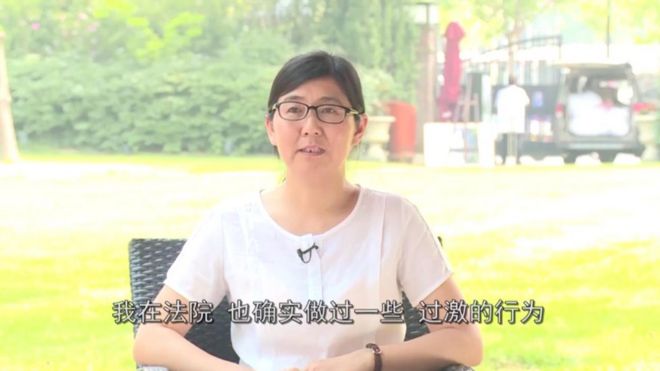 |
| Lawyer Wang Yu was filmed saying: “In court, I carried out some extreme acts” The Paper |
Last week, Lin Zuluan, the democratically-elected leader of Wukan in southern Guangdong province, was charged with taking bribes, though his “confession” video met with heavy online criticism.
Mr Lin’s “confession” was aired on a number of national state broadcasters, including the official CCTV, and Shanghai’s leading provincial channel, Dragon TV.
He is filmed being asked by a policeman: “What do you need to confess to us today?”
Mr Lin responds: “Because of my thin knowledge and ignorance of the law, during public ventures, I accepted funds and kickbacks from all kinds of projects.
“Because of these faults, I most faithfully give myself up to the police and the prosecuting authorities. These points I confess are the sworn truth.”
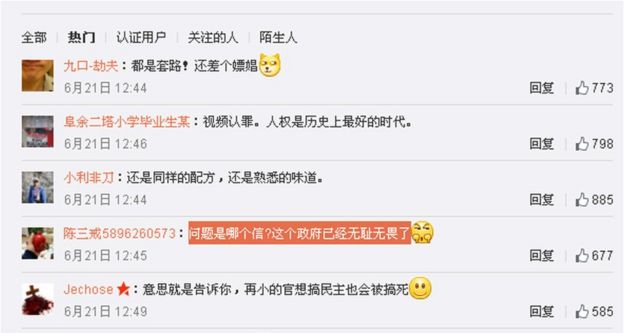 |
| Posts criticising state media for showing the video received hundreds of likes |
Mr Lin’s “confession” has been viewed more than 71 million times on the online video platform Tencent TV.
It has also been shared more than 7,000 times via state-affiliated news website The Paper, and thousands of Sina Weibo users are discussing it.
It received heavy criticism from social media users, who say that such videos do not appear natural, and have simply become “routine”.
“He read the manuscript well,” says qtds, while ShedeLong quips: “My God, he obviously prepared his script in advance.”
Many also criticise state media for sharing the video, saying that it “discredits” Mr Lin before he has faced trial.
“Without trial, what has he got to be guilty of?” asks Lugong Weixin.
 |
| “Confession” videos have become common on Chinese TV |
Chen Sanjie adds: “You know where the problem is? It’s in the shamelessness and fearlessness of our government.” His comment has received more than 600 likes.
Police ‘confessions’
Televised confessions have become commonplace on Chinese state TV, particularly since Mr Xi became president in 2013.
They have mainly featured independent news journalists, including former Deutsche Welle journalist Gao Yu, US news portal freelancer Xiang Nanfu, and Wang Xiaolu from the mainland-based Caijing magazine.
Some have also featured activists, whose behaviour has run counter to government interests.
In January, state broadcaster CCTV aired a “confession” video of Swedish human rights activist Peter Dahlin, who was arrested for “instigating confrontations” and “distorting” reports.
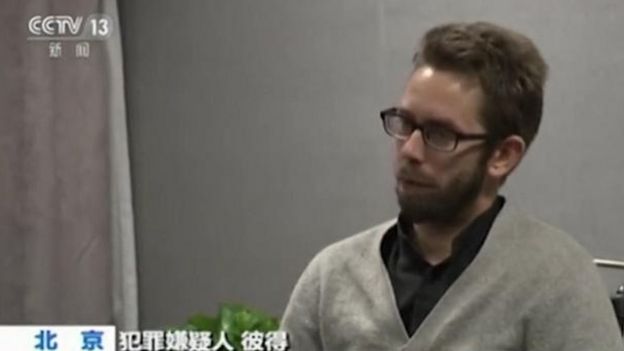 |
| Activist Peter Dahlin was filmed admitting to “instigating confrontations” on CCTV CCTV |
The same month, Hong Kong publisher Gui Minhai appeared on the channel saying he was voluntarily handing himself over to the authorities for an outstanding drink-driving conviction.
Mr Gui was reported “missing” in December 2015, along with four other publishers, and his disappearance was originally believed by close family members to be related to him selling publications banned on the Chinese mainland.
Celebrity ‘confessions’
“Confession” videos have also increasingly featured celebrities.
Taiwanese pop singer Kai Ko and Jaycee Chan, the son of actor Jackie Chan were shown on CCTV apologising for drugs abuses in August 2014.
The same month, Guo Meimei, a Chinese internet celebrity, was filmed apologising to the police for prostitution and arranging gambling events.
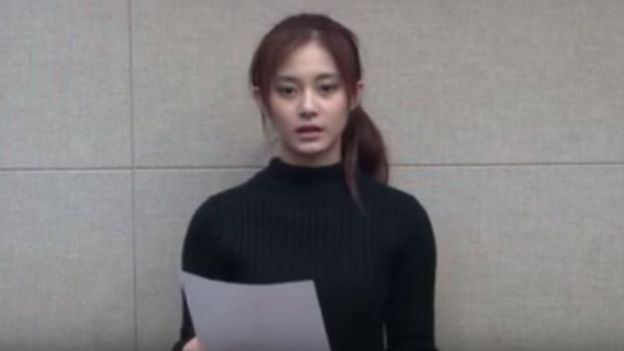 |
| Singer Chou Tzuyu apologised online for appearing with a Republic of China flag YouTube – JYP Entertainment |
More recently, there has become a noted trend of celebrities issuing apologies that are unrelated to criminal activity.
In January, Taiwanese singer Chou Tzuyu posted an apology video to China after pictures of her emerged alongside a Republic of China flag, and she was perceived as inciting independence for Taiwan.
And in July, American-Japanese actress Kiko Mizuhara uploaded an apology video to China, after she “liked” a controversial social media post showing someone giving the middle finger in Tiananmen Square.
#ApologiseToChina or #ApologiseToTaiwan?
Televised confessions have become so commonplace that they have become a source of mockery.
Recently, after thousands in Taiwan signed up to a satirical Facebook event to offer “apologies” to China because of their commonality, a further 4,000 mainland users on Sina Weibo joined in using the hashtag #FirstAnnualApologiseToChinaContest.
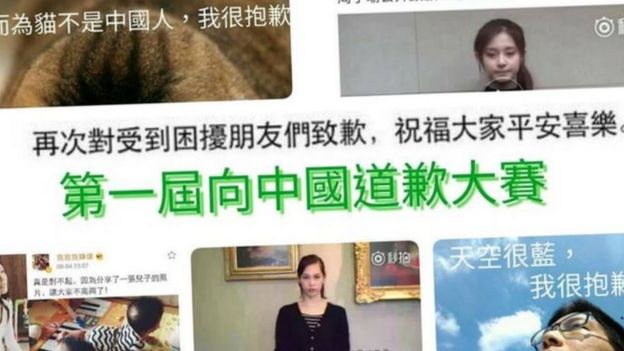 |
| Thousands of overseas Chinese mocked televised confessions in a Facebook event |
A large number of posts since appear to have been removed from the platform, and state media instead tried to encourage users to post using the #FirstAnnualApologiseToTaiwanContest hashtag, and point mockery towards the island.
Yet some users have managed to bypass government censors by using traditional, rather than simplified Chinese characters, or by posting screenshots to avoid using sensitive words.
User HotaruWong, whose post has not been censored, issues her own confession, apologising for liking the Taiwan campaign “a lot”.
BBC Monitoring reports and analyses news from TV, radio, web and print media around the world. You can follow BBC Monitoring on Twitter and Facebook.
China Aid Media Team
Cell: (432) 553-1080 | Office: 1+ (888) 889-7757 | Other: (432) 689-6985
Email: [email protected]
For more information, click here
